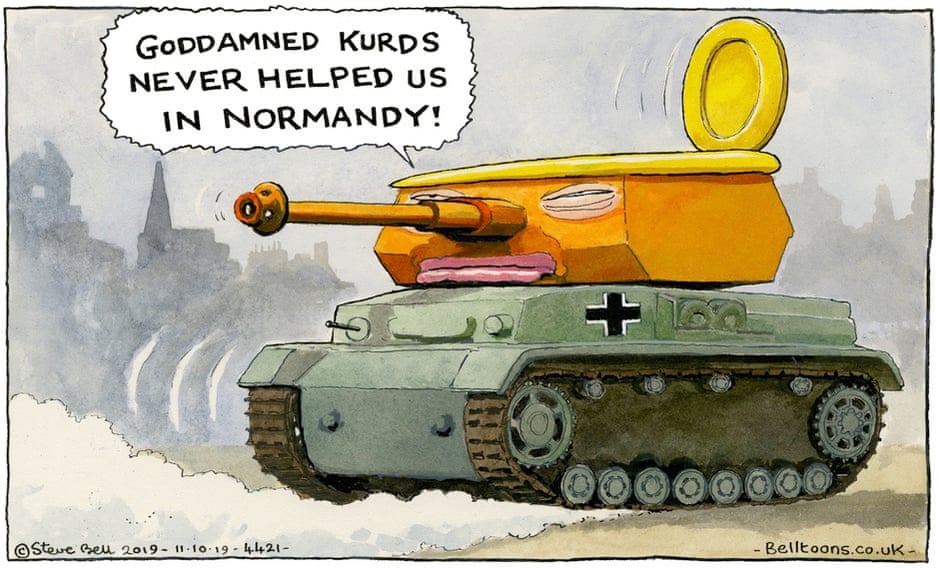Turkey begins military offensive in Syria, days after Trump announced pullback of US troops [https://www.cnn.com/2019/10/09/politics/syria-turkey-invasion-intl-hnk/index.html]
To be fair, while some of us state-side are shocked, the Kurds braced themselves for this likelihood back in 2016 [https://www.nytimes.com/2016/09/02/world/middleeast/kurds-syria-turkey.html].Turkey has launched a planned military offensive into northeastern Syria, President Recep Tayyip Erdogan announced Wednesday, just days after the Trump administration announced it was pulling US troops back from the border area.
"Our aim is to destroy the terror corridor which is trying to be established on our southern border and to bring peace and peace to the region," Erdogan tweeted.
He added that Turkey "will preserve Syria's territorial integrity and liberate local communities from terrorists."
Shortly after Erdogan announced the offensive, the spokesman for the Kurdish-led Syrian Democratic Forces (SDF) -- a key US ally in northern Syria -- claimed that warplanes had begun carrying out airstrikes on civilian areas. "There is huge panic among people in the region," spokesman Mustafa Bali wrote.
A US official familiar with operations in Syria confirmed that Turkey conducted strikes in Tal Abyad in northern Syria and the border town of Ras al-Ayn.
Witnesses and two fighters for the Kurdish People's Protection Units (YPG) told CNN that hundreds of civilians in northern Syria had fled areas on the border with Turkey. The fighters also said Turkey had used heavy artillery and conducted airstrikes on Ras al-Ayn.
The offensive comes days after US President Donald Trump provoked a storm of criticism, including from his own party, by announcing the pullback of US military forces from the region. Trump's decision in effect gave Turkey a green light to attack US-backed Kurdish forces, though Trump threatened to punish Turkey economically if it does 'anything outside of what we think is humane.'
At this point, there is no rhetoric that is too harsh for this 'man' and the administration. His every action hurts us and sadly hurts the world around us. The time for kindness is over. However we have to get him out, save for actually hurting or killing him, must be done.For almost two years, Syrian Kurds, with American weapons, air cover and training, have fought and died in battle against the Islamic State. They have taken pride in their status as the United States' most faithful proxy in the fight against the militant group, and they have hoped their effectiveness as warriors would lead to American support for Kurdish political gains inside Syria.
So, many Kurds shuddered when Turkish tanks and soldiers recently rolled into northern Syria, with American support, to push back against Kurdish gains. They saw it, perhaps prematurely, as a replay of a century of betrayal by world powers, going back to the end of World War I, when they were promised, then denied, their own state in the postwar settlement.
"The Kurds are going to scream betrayal at every turn when they think things are not going to go their way, because they've had a century of it," said Joost Hiltermann, the program director for the Middle East and North Africa at the International Crisis Group, and a longtime expert on the Kurds.
...
Drawing on history, Kurds see themselves as the playthings of world powers, used in proxy fights when it serves someone's interest and then discarded.
The United States, on balance, has arguably been a great friend to the Kurds, coming to their aid after the Persian Gulf war in the early 1990s and helping to establish an autonomous region for them in Iraq, safe from Saddam Hussein's brutality.
However, the United States also figures prominently in that historical memory of betrayal. In 1975, after the C.I.A. worked with Iran to supply weapons to the Kurds to fight Mr. Hussein's regime, Secretary of State Henry A. Kissinger abruptly pulled the plug after a reconciliation between Tehran and Baghdad.
"In 1975, the same betrayal of the Kurds happened," said Hasos Hard, a Kurdish journalist in northern Iraq, when asked about his reaction to the American support for Turkey's Syria incursion.
Many analysts, though, as well as Syrian Kurdish fighters on the ground, say the accusations of betrayal are not quite right - at least not yet.
There is little sign that the United States has abandoned the Syrian Kurds. American officials have worked to negotiate a truce on the ground between the rebels backed by Turkey and the Kurdish militia, known as the People?s Protection Units, and fighting has calmed in recent days.
But many Kurds say they now see the writing on the wall and worry that once the Islamic State is driven from its capital in the Syrian city of Raqqa, the United States will sell them out.

